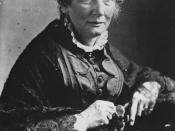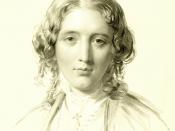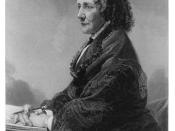Uncle Tom's Cabin:
Inside Harriet Beecher Stowe's Cabin
Harriet Beecher Stowe's Uncle Tom's Cabin portrays complicated relationships between Blacks and Whites in the antebellum period. Her purpose of writing this novel is to point out that how destructive slavery is to African-American people and that slavery should be condemned. By hearing that " Christian and humane people actually [recommend] the remanding escaped fugitives into slavery, as a duty binding on good citizens, - [...], - she could only think [that] these men and Christians cannot know what slavery is. [...] And from this arose a desire to exhibit it in a living dramatic reality"(440). Knowing the fact that Whites see Blacks as inferiors, she tries to bring out good-natured characteristics of African-American people by creating some stereotypes that she thinks suitable for them such as docility and sensitiveness. Despite her praiseworthy intention, stereotypes that she picks have not quite persuaded readers to reconsidering Blacks as an independent and sovereign race.
Instead, stereotypes expose her personal attitude toward Blacks. She still considers them as second-rate citizens as other Whites do. Not only stereotypes obscure her purpose, but they also reveal herself as a racist.
Many stereotypes are used in this novel to create some impressions about specific races: Black people, Northerners, or Southerners. However, Black stereotypes are the most mentioned throughout the story. She describes as many admirable stereotypes of them as one white person could do. Blacks are "sensitive and impressible race"(287). They always show their emotions when something strikes their feelings, whether positive or negative way. For example, Tom is astounded by the angelic look of Eva because of his "soft, impressible nature of his kindly race, even yearning toward the simple and childlike"(144), or St. Clare's servants cry their heart out when their beloved Eva dies.


